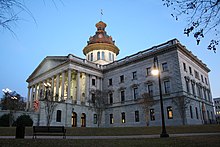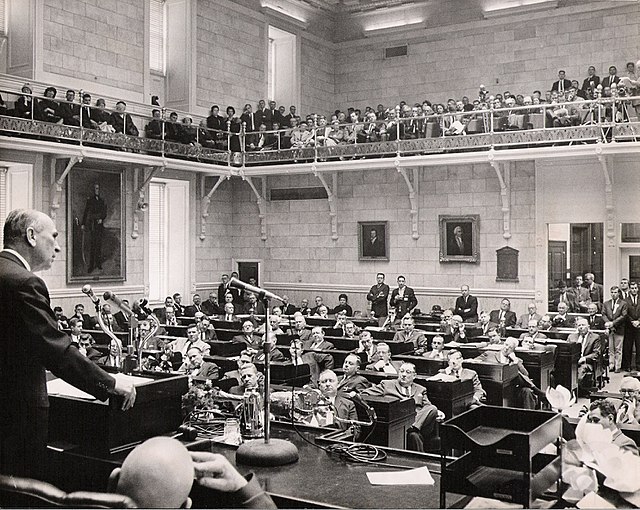Loading AI tools
Legislative branch of the state government of South Carolina From Wikipedia, the free encyclopedia
The South Carolina General Assembly, also called the South Carolina Legislature, is the state legislature of the U.S. state of South Carolina. The legislature is bicameral and consists of the lower South Carolina House of Representatives and the upper South Carolina Senate. All together, the General Assembly consists of 170 members. The legislature convenes at the State House in Columbia.
South Carolina General Assembly | |
|---|---|
 | |
| Type | |
| Type | |
| Houses | Senate House of Representatives |
| History | |
| Founded | 1753 |
| Leadership | |
| Structure | |
| Seats | 170 voting members: 46 Senators 124 Representatives |
 | |
Senate political groups | Republican (30) Democratic (15) Independent (1) |
 | |
House political groups | Republican (88) Democratic (36)[1] |
| Elections | |
Last Senate election | November 2020 |
Last House election | November 2022 |
| Meeting place | |
 | |
| South Carolina State House Columbia | |
| Website | |
| scstatehouse.gov | |
| Constitution | |
| Constitution of South Carolina | |

Prior to the 1964 federal Reynolds v. Sims decision by the U.S. Supreme Court, each county doubled as a legislative district, with each county electing one senator and at least one representative. Moreover, each county's General Assembly delegation also doubled as its county council, as the state constitution made no provision for local government.
The "one man, one vote" provision of Reynolds v. Sims[2] caused district lines to cross county lines, causing legislators to be on multiple county councils. This led to the passage of the Home Rule Act of 1975, which created county councils that were independent of the General Assembly. However, the General Assembly still retains considerable authority over local government. As a result, the legislature still devotes considerable time to local matters, and county legislative delegations still handle many matters that are handled by county governments in the rest of the country.[3]
There are 124 members of the South Carolina House of Representatives, who are elected every two years, and the South Carolina Senate has 46 members, elected every four years concurrent to the presidential election. For both houses, there are no term limits. The General Assembly meets in joint session to elect judges, with all 170 members having an equal vote in such elections.
The main role of the South Carolina General Assembly is to pass laws "as the common good may require."[4] In order for a bill to become law, both the Senate and House of Representatives must vote to pass the bill by a simple majority. Then the bill must be sent to the governor. If the governor vetoes the bill, both houses can either sustain the veto or override the veto. Veto overrides require a two-thirds majority. Once he receives the bill, if the governor neither signs nor vetoes the bill, it becomes law after five days, Sundays excluded.[5]
According to the South Carolina Constitution, no person may serve as a senator who:[6]
According to the South Carolina Constitution, no person may serve as a representative who:[7]

| South Carolina Senate officers | ||
|---|---|---|
| Position | Name | Party |
| President of the Senate | Thomas C. Alexander | Republican |
| Majority Leader | A. Shane Massey | Republican |
| Minority Leader | Brad Hutto | Democratic |
| South Carolina House of Representatives officers | ||
|---|---|---|
| Position | Name | Party |
| Speaker | Murrell Smith | Republican |
| Speaker pro tempore | Tommy Pope | Republican |
| Majority Leader | Davey Hiott | Republican |
| Minority Leader | J. Todd Rutherford | Democratic |
| Year[a] | Senate Majority |
House Majority |
Governor Control |
|---|---|---|---|
| 1868 | Republican | Republican | Republican |
| 1870 | |||
| 1872 | |||
| 1874 | |||
| 1876 | Democratic | Democratic | |
| 1878 | Democratic | ||
| 1880 | |||
| 1882 | |||
| 1884 | |||
| 1886 | |||
| 1888 | |||
| 1890 | |||
| 1892 | |||
| 1894 | |||
| 1896 | |||
| 1898 | |||
| 1900 | |||
| 1902 | |||
| 1904 | |||
| 1906 | |||
| 1908 | |||
| 1910 | |||
| 1912 | |||
| 1914 | |||
| 1916 | |||
| 1918 | |||
| 1920 | |||
| 1922 | |||
| 1924 | |||
| 1926 | |||
| 1930 | |||
| 1934 | |||
| 1938 | |||
| 1942 | |||
| 1946 | |||
| 1950 | |||
| 1954 | |||
| 1958 | |||
| 1962 | |||
| 1966 | |||
| 1970 | |||
| 1974 | Republican | ||
| 1978 | Democratic | ||
| 1982 | |||
| 1986 | Republican | ||
| 1990 | |||
| 1994 | Republican | ||
| 1998 | Republican | Democratic | |
| 2002 | Republican | ||
| 2006 | |||
| 2010 | |||
| 2014 | |||
| 2018 | |||
| 2022 | |||
| 2024 | |||
| 2026 | TBD |
Seamless Wikipedia browsing. On steroids.
Every time you click a link to Wikipedia, Wiktionary or Wikiquote in your browser's search results, it will show the modern Wikiwand interface.
Wikiwand extension is a five stars, simple, with minimum permission required to keep your browsing private, safe and transparent.